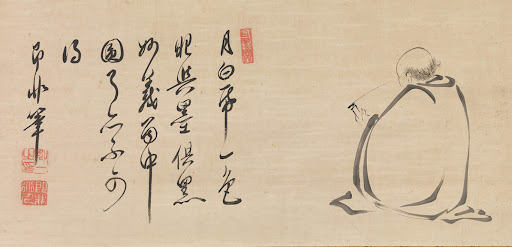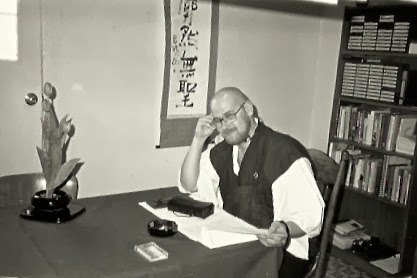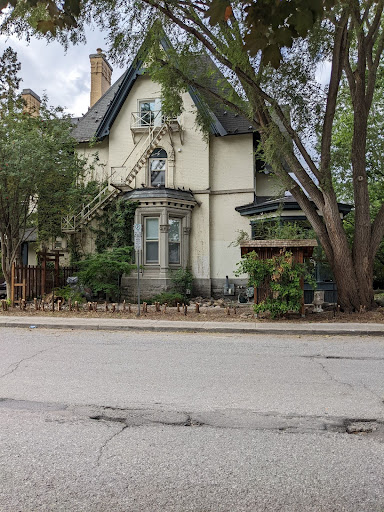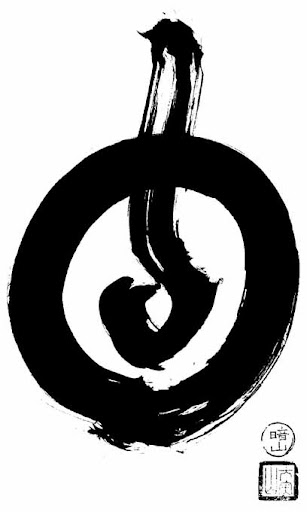
Reading a sutra by moonlight by Sokuhei

Reading a sutra by moonlight by Sokuhei
eMirror Vol 26, No. 38
Friday, September 16th, 2022
Edited by the Practice Council
The White Wind Zen Community:
An international community practising and teaching Dogen’s Zen since 1985.
There are many writing exercises that can be used to sharpen and clarify and shift one’s sense of language. Most of these are not about what to write but how writing is. Used in the context of mindfulness they might help show how you can step out of the way, not fall into thinking about what to write but to allow writing to use the paper and pen. Each blank sheet of paper presents the poet with a moment of Sky. The sudden surge of creative energy that moves in that Sky must be grounded in what has been learned and is being learned of language, of meanings but you cannot think about it too much. Just write. Many of your poems might require all manner of explanation for this or that line to make sense. They make sense to you but other people who read it look puzzled. If so, you have been writing poetry but this is not a poem. You have been practising an art form but it is not yet art.
Perhaps there is a line here or there or at the beginning and end of a poem that can be pulled from the rest of the turgid tangle of too much discursiveness and put together. Recognizing this, knowing how to edit away what is too much, what weakens the words is essential. Eventually there might be a poem that can stand on its own, that is alive, that is the Being of the balance of Sky and Ground.
-Ven Anzan Hoshin roshi, continuing Class Six: "The Mind Is Not 'The' Mind" in the series "Zen Arts: The Flowering of the Senses", October 1999 Daruma-ki O-sesshin, Dainen-ji.
We will be reopening regular sittings to students, beginning with the Saturday morning sitting for general students on October 15th. The sitting begins at 9:30 a.m. First Bell is at 9:15 a.m. The sitting ends at 11:50 a.m. If required we will be using two practice Halls for sittings (the Hatto and Zendo) to ensure adequate spacing. All students attending will be required to wear an N-95 mask. We will be sending emails to all students with further plans for re-opening.
Both the Monday and Thursday evening sittings are reserved for associate students, who may attend one sitting per week. General students are to attend a minimum of two sittings each week: one morning formal sitting each week and the general sitting on Saturday mornings. Attending both the formal sitting and the general sitting will count as a half-day retreat (breakfast at the monastery, dana $5).
Fusatsu: September 28th.
Introduction to Zen Workshop
The next Introduction to Zen Workshop will take place on Saturday, October 1st, at 1:45 p.m. For more information please see:
https://wwzc.org/introduction-zen-workshop-ottawa
For information concerning our Long-distance Training Program, please visit this Web Page: https://wwzc.org/long-distance-training-program
Daruma-ki O-sesshin
The Daruma-ki O-sesshin will begin at 8:00 p.m. on Sunday, October 2nd, and will end on Sunday, October 9th at noon. Formal students are reminded to send their schedules to schedule at wwzc dot org as soon as possible.
A Note to Preliminary and Public Students Concerning O-sesshin
During an O-sesshin the schedule is such that there is no time for monastics to take telephone calls or reply to email correspondence sent by public students (unless it’s an emergency). Students are asked to send their weekly practice journals, as they will be reviewed. But unless there is something that needs an immediate reply, you will not receive an email reply until the week following the O-sesshin.
Hermitage
The Roshi is continuing an extended period of "self-isolation" due to underlying health issues until the COVID-19 situation clarifies.
Beginning Instruction in Zen Practice
For information concerning our Long-distance Training Program, please visit this Web Page: https://wwzc.org/long-distance-training-program
Rev. Chiso anagarika sat her weekly semi-retreat on Tuesday, September 13th at her home in the Berkshires. Isshin sat a two-day retreat in alignment with the sesshin schedule at Dainen-ji. Tracey Parker sat a half-day retreat on Sunday, September 11th at her home in Perth, Ontario.
If you would like to sit a retreat at home please follow the schedule outlined in this page: https://wwzc.org/retreat-schedule-public-students. After your retreat, please send an email to schedule@wwzc.org to confirm that you sat a retreat and include the duration and location.
If you would like to sit a retreat at Dainen-ji, please email schedule@wwzc.org to register.
You would need to schedule your retreat a week in advance. You will also need to get a rapid antigen Covid test done the day before you arrive and email us to let us know that you are Covid negative.
You will need to wear an N-95 mask while in the monastery. This link will let you know where you can pick up a free rapid antigen test https://covid-19.ontario.ca/rapid-test-locator
You can sit a partial retreat, half-day retreat or full retreat for one or more days (providing you stay in the monastery and do not leave). The duration of retreats is as follows:
Half-day Retreat
You would need to arrive 15 minutes before the actual starting time. Begin at 6:00 a.m., end at noon. Or begin at 9:30 a.m., end at 6:00. Or begin at 3:00 p.m., end at 9:10.
Partial Retreat
You would need to arrive 15 minutes before the actual starting time. Begin at 6:00 a.m., end at 6:00 p.m. Or begin at 9:30 a.m., end at 9:10 p.m.
Full retreat
You would need to arrive by 5:45 a.m. Begin at 6:00 a.m., end at 9:10 p.m.
Please remember to bring a change of clothes suitable for samu (caretaking practice). If staying overnight, please remember to bring a sleeping bag, a towel and other such necessities. If you have been diagnosed by a medical doctor as having allergies to specific foods, please contact the tenzo-anja, mishin godo at mishin at gmail dot com, a week in advance of your retreat to inform her of dietary restrictions as this affects food purchases and meal planning. The suggested dana for retreats is $50 for a full day or $40 for a partial day, which covers the basic cost of food and other materials. Donations above this figure are very welcome and all donations are tax deductible.
If you would like to schedule a retreat, please send an email to schedule@wwzc.org.
Saturday, September 17th to Saturday, September 24th
Saturday, September 17th: “Wild Time: Zen Master Anzan Hoshin's commentaries on “Uji: Being Time” by Eihei Dogen zenji: “Drunk and Walled In" (6 of 13, 35 minutes)
Sunday, September 18th: SAkN: "The Anatomy of Awakening" by Ven. Anzan Hoshin roshi: "Knowing as Feeling" (3 of 9)
Monday, September 19th: Hekiganroku 40: Flower in a Dream: "Yuanwu's Pointing Phrases" by Ven. Anzan Hoshin roshi (1 of 3, 14 minutes)
Thursday, September 22nd: "The Sky Around the Clouds: The Sky Sits Up Straight" by Ven. Jinmyo Renge sensei (1 of 2, 9 minutes)
Saturday, September 24th: “Wild Time: Zen Master Anzan Hoshin's commentaries on “Uji: Being Time” by Eihei Dogen zenji: “Shining Forth" (7 of 13, 29 minutes)
Associate and general students should continue to follow the recorded Teachings schedule for the sitting you were attending at the monastery, and listen to that during your home practice.
You can access the online Recorded Teachings Library at wwzc.org/recorded-teachings-schedule.
You can also use the streaming site at app.wwzc.org to live stream recordings from the online Library. If you have forgotten your password or need assistance with accessing the recorded Teachings, please email schedule@wwzc.org.
Please note that teisho should be listened to in the correct order and with none missed out as themes, metaphors, questions raised and answered evolve in spirals throughout the series.
While most of the online Recorded Teachings library is password-protected and only accessible to students of the Lineage of Zen Master Anzan Hoshin, a small selection of MP3 recordings of teisho are accessible to the public at wwzc.org/recorded-teachings Additional recordings will be uploaded periodically. MP3 recordings of four recorded teisho by Ven. Anzan Hoshin roshi are currently available:
Dharma Position https://wwzc.org/dharma-position
Eyes See, Ears Hear https://wwzc.org/eyes-see-ears-hear
Embarrassment https://wwzc.org/embarrassment
Ven. Anzan Hoshin roshi's reading of his translation of Eihei Dogen zenji's “Bendowa: A Talk on Exerting the Way”: https://wwzc.org/bendowa-talk-exerting-way

Photograph of Ven. Anzan Hoshin roshi at Daijozan, mid-1980s,
by Ven. Shikai Zuiko sensei
Ven. Anzan Hoshin roshi has recently completed translation work on some shorter texts by Eihei Dogen zenji from the Shobogenzo. The work on these particular texts is based upon the literal translations that he worked on with Joshu Dainen roshi at Hakukaze-ji around 1977-78 followed by many years of putting them down, picking them up, and polishing. Naturally, more essential texts such as Uji, Genjokoan, Shinjin Gakudo and some 40 others were completed first and have been given extensive commentaries by the Roshi. This batch of texts includes Baike: Plum Blossoms, Ryugin: Howling Dragon, and Udonge: The Udumbara Blossoming and many others are nearing completion. Annotation details and successfully conveying them across various document formats are the issue at this point.
Work on Bussho: Buddha Nature, a very long and nuanced text by Dogen zenji, is ongoing.
Roshi is also finishing an update to the Saijo Shingi: The Deportment of Radiance, our manual of monastic training standards which is a supplement to the ancient Eihei Shingi and Keizan Shingi.
In preparation for planting a new stretch of hedge along the East (Friel Street) side of the monastery, all of the old cedars were cut down and the roots removed. The cedars were very old and had become quite ‘bald’ in some areas and were encroaching into the sidewalk. Cedars need a lot of light and they were not able to thrive under the shade of the massive Chinese elm on that side of the property.
Cutting the hedge down now will make the work of planting 59 yews much simpler in the spring, as they preferably should be planted as early in the spring as possible after the ground thaws. For the winter months we will put the fence back up. Most of us had never really seen the whole of the monastery from that side as the old cedar hedge blocked the view.
This is the side view of the monastery showing the bay window of the Shuryo (library) on the first floor. The rain shelter (seen next to the elm tree) was moved and will be relocated on the grounds. The cedar stumps have now been removed so we can put the fence back up for the winter.
We were able to purchase the 59 yews needed to complete the hedge at the same price we paid for them last year. Funding is already in place for the new yews and to cover the cost of removing the old hedge.
And in this view you can also see a few of the Roshi’s pigeon friends up on the roofs, waiting for lunch seed.

Begun by Ven. Shikai Zuiko o-sensei
Finished by Rev. Fushin Comeau shramon following her death

Ten thousand dharmas: Numbered things, all experiences
Posted September 9th, 2022. New entries are posted every two weeks.

Dogen zenji taught in the Tenzo kyokun: Instructions for the Tenzo (https://wwzc.org/dharma-text/tenzo-kyokun-instructions-tenzo) that the work of preparing and serving meals is "a matter for realized monks who have the mind of the Way “, or by senior disciples who have roused the Way-seeking mind." In alignment with this, part of Zen Master Anzan Hoshin's samu for the Community involves personally overseeing the activities of the ancient office of tenzo. Ven. Jinmyo Renge sensei serves as tenzo and Mishin godo and Saigyo ino offer assistance as tenzo-anja. The following meals were prepared on Monday, Tuesday and Thursday evenings for residents:
Monday Yakuseki:
Cavatappi pasta with mushroom sauce (monastery-made mushroom seasoning made from ground dried cremini and shitake mushrooms, garlic and onion powder and salt, with sauteed sliced fresh cremini mushrooms, oregano, basil, lots of black pepper, served with Parmesan cheese); deep-fried tofu triangles with sliced Spanish onion and gai lan (Chinese broccoli) in chili sauce; friulano cheese with gherkins.
Tuesday Yakuseki:
Mixed grain (arborio rice, calrose rice, Chinese rice, pearled barley); tonkatsu sauce (onion, Asian pears, HP sauce, ketchup, shoyu, sesame oil); thinly sliced green cabbage served with lemon wedges; takuan and gari.
Vegetarian option: deep fried spicy breaded tofu.
For those who wished to supplement their diet with meat: tonkatsu (pounded pork cutlets breaded with panko and deep fried);
Thursday Yakuseki:
Mixed grain (white and brown calrose, arborio rice, pearl barley); bulgogi tofu (chopped Spanish onion, poblano, red shepherd’s bell, deep-fried tofu, minced garlic, bulgogi sauce, shoyu); stir-fried gai lan and Shanghai bok choy with lime juice.
Meals Prepared During the September Sesshin:
Saturday:
Breakfast: Rice and eggs.
Lunch: Mixed grain (white and brown Calrose) garnished with gomashio (roasted ground sesame seeds and salt); miso shiru (broth made from kombu, slivered ginger, shiro miso, dried shiitake mushrooms, Shanghai bok choy, shoyu, mirin, rice vinegar, cubed silken tofu); takuan and gari.
Supper: Southwestern fried rice (white and brown basmati rice, chopped Spanish onion and monastery-grown poblano and jalapeno peppers, red bell pepper, garlic powder, onion powder, cumin coriander, chipotle sauce, smoked paprika, salt and black pepper); fresh corn soup (corn cut from the cobs, cobs scraped for corn milk, white onion, celery, sliced yukon gold potatoes, salt, black pepper, cayenne, butter, vegetable broth); salad of sliced cucumber, yellow and red cherry tomatoes, chives and basil, and red wine vinegar).
Sunday:
Breakfast: Fried leftover southwestern rice with scrambled eggs.
Lunch: Thai jasmine rice garnished with sauteed daikon in chile sauce; spicy wakame seaweed soup (leftover strained miso shiru broth and shiitake mushrooms, wakame, ginger, shoyu, roasted chile oil), with silken tofu; kimchi.

If you would like to thank someone for a contribution they have made, please feel free to send an email to Jinmyo sensei at rengezo@gmail dot com, but be sure to type "eMirror” in the subject line.
From Mishin godo:
Thank you to Jinmyo sensei for leading the September sesshin.
From Saigyo Ino:
Thank you to Jinmyo sensei for skilfully redesigning the basement pantry so that residents can safely store bicycles inside the building (after having many stolen). Thank you to Fushin shuso and our neighbour, Wayne Gong for moving the rain shelter so that the cedar stumps could be dug up. Thank you to Alex Bourne for samu to dismantle a metal shelving unit so that we could relocate a chest freezer. Thank you to David Gallant for picking up a metal garbage can and bicycle hooks.
From the Office of the Treasurer:
Thank you to Jinmyo sensei for a donation for removing the cedar hedge, to replace it with yew trees next spring. Thank you to Helen Jelich and Jeffrey Wilkins for donations.
|